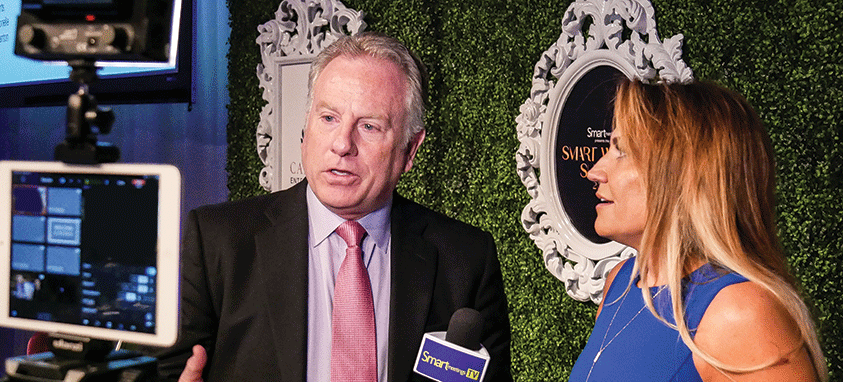Top presenters describe how planners can help speakers deliver for attendees
An important part of a conference organizer’s responsibilities is hiring or recommending speakers for the events they manage. Whether it’s a keynote address, workshop, breakout session or another forum, selecting speakers who match best with the profile and needs of the audience is a critical task.
Typically, this conversation focuses on the planner’s side of the equation and what they require, but what about the speaker’s needs and expectations?
As a professional speaker for the past 10 years, I have worked with more than 100 meeting professionals through the selection process, fee negotiations, content creation and logistical details. I have found most planners to be “speaker-friendly,” but a few seem to look at the speaker as an after-thought, or the low person on the totem pole of priorities.
To gain a broader perspective, I reached out to several respected speakers across the country, all with impressive credentials and experience dealing with professional planners from a diverse group of organizations.
Speakers Weigh in on Perceived ‘Disconnect’
The prominent speakers I interviewed shared their thoughts regarding the planner-speaker relationship and some of the areas that merit a closer look. Some believe there is a disconnect with planners from time to time as the speaker selection process unfolds, and after the contract has been signed. All of them emphasized that clear communication is essential early in the process, as it lays the foundation for a mutually beneficial experience.
Fred Reggie, an international speaker, says the No. 1 issue he has encountered is “failure to establish value relative to the fee. Not doing so opens the door to some very sticky negotiations that could ultimately prove detrimental to both the speaker and the meeting planner.” He goes on to say that before putting out a call for speakers, conference planners should have a full understanding of their desired outcomes.
“If the planner is charged with finding a ‘leadership’ speaker or a ‘service culture’ speaker, try to understand what the objectives are in order to have a meaningful conversation with the speaker,” he suggests.
Michael Dominguez, CHSE, president and CEO of Associated Luxury Hotels International, is one of the most popular speakers in the meetings industry. Each year, he crisscrosses the country (and speaks to international groups, as well), delivering dynamic talks that focus on leadership and hospitality trends.
“It is so important to get really good information/data regarding the audience and what it is really looking to get out of a presentation,” he asserts. “Specifics on the growth areas and pain points from their perspective are so helpful.”
Another important factor in the relationship between a planner and a speaker is trust. Deborah Gardner, CMP—an author, speaker and hospitality industry expert—says, “Relax. You’ve paid me for my expertise in my subject matter, but also in the ability to deliver an amazing program. No need to be a worrywart.”
Practical Tips
A good rule of thumb when dealing with speakers is to book them as far in advance as possible so there is ample time to communicate back and forth prior to the event and establish clear expectations on both sides. If the speaker is contracted through a speakers bureau, insert a clause in the agreement that the speaker be made available for a conference call with the planner and the person responsible for the content of the conference.
Here are some other important items that will result in a better experience for the speaker, the host organization and the audience.
- Give the speaker as much background information on the organization, its purpose and the goals of the conference (and session) as possible. This will allow the speaker to customize his/her content accordingly, resulting in a much more engaging and relevant presentation.
- Promote the speaker and his/her background and credentials on social media and in conference materials to generate buzz and encourage attendance. Most speakers are happy to provide a short custom video to be used on the client’s website or Facebook page to encourage people to attend.
- Have a point person assigned to the speaker on site so any last minute logistical or technical requests can be communicated quickly and efficiently to the venue or AV person.
One frequently requested requirement by planners, and considered somewhat unreasonable by some speakers, is to provide PowerPoint slides a month or more before the event.
“Requesting the slides far in advance for events can be challenging,” says Neen James, an author and leadership expert who delivers high-energy keynote presentations around the globe. “Not because we don’t know what we want to say, or are unprepared, but because many of us tailor our presentations for each audience based on interviews with the key committee or organizational members, reviewing social media conversations, and research about their industry [which generally occurs closer to the event].”
A good compromise might be to shorten the time frame to a week before the event.
Another area where speakers don’t always see eye to eye is whether their presentation can be recorded or videotaped. Some are concerned that their proprietary information or intellectual property will be shared without permission, or in some cases lifted and used in someone else’s presentation, as has happened to me.
The same applies to giving audience members a copy of the slide deck. My position on this is to transfer the PowerPoint to a PDF document, which is difficult to copy or use in another setting.
The speakers quoted in this article differed in their responses as to whether they allow the conference organizer to keep and/or disseminate an audio or video recording of their talk. Some allow no videotaping at all, whereas others will consent if parameters have been established or negotiated in advance.
Dominguez and Gardner believe that sharing content with the world is a good thing in most cases, and will drive greater awareness of the speaker and the message.
On-site Requirements
It is always a good practice to meet with the speaker once they have arrived on site to go over the logistical details and timing of their talk.
The planner and speaker should visit the room where the presentation will take place together, preferably well before the start time of the session. Room inspections allow ample time for changes to be made (stage, stairs, screen position, podium, sound system, etc.)
Upon arrival, speakers (rightfully) expect to find the room set in the agreed-upon configuration. All too often—most probably because of miscommunication or oversight—a speaker arrives to find the room set theater-style rather than school-room style, or vice versa. The last-minute rush to rearrange the seating is an easily avoidable, unnecessary distraction and stressor.
Specific details related to the room are very important for most speakers, and in many cases, language is written into the agreement that pertains precisely to a speaker’s particular needs. For example, James says, “Read the tech rider [a document specifying the speaker’s technical requirements]. As a speaker who is only 4-foot-10, wears stilettos on stage, travels with her own microphone and often uses a flip chart, [our] tech rider states we’d prefer the lectern removed—the audience can’t see me—and the platform seams taped so my stilettos don’t get caught in the cracks of the stage.”
As is usually the case, the simple solution to minimize potential issues is to make sure the planner and the speaker are on the same page. “Teamwork makes the dream work,” says Judi Holler, author and keynote speaker.
“A speaker is in different rooms every week, with different planners, with different AV teams and different groups,” she continues. “My goal is to make the planner look amazing and to make sure that I deliver a talk that elevates the attendee experience. If we talk in advance about the music playing in the room, the way the room is set up, who is in the front rows and make sure the AV is on point, it makes for a fun experience for all of us, most importantly the attendees.”
Holly Hoffman, CSP, a seasoned professional speaker and author, feels that one area that is often overlooked is managing the clock. Sometimes a program runs late because the organizers underestimated the time for opening remarks and sponsor talks, which cuts into the speaker’s time. It is very difficult for a speaker to deliver the full impact of their talk when the allotted time has been cut back 10–15 minutes due to mismanagement of the agenda timeline.
“I have been the closing speaker, and because some of the other speakers before me have gone over their stage time, I then get cut short,” she says. “Always make sure all speakers know and understand clearly the amount of time they have on stage.”
Other speaker pet peeves include uncomfortable room temperature, poor lighting, a screen too small for the size of the room or audience, an inadequate sound system and a room too small to accommodate the anticipated number of participants, causing a standing-room only scenario.
The above-mentioned scene is, unfortunately, all too familiar. Recently, I delivered a talk in a room with a maximum capacity of 125 people. When I pointed out to the organizer the day before the session that more than 150 people had preregistered, the response I received was, “Don’t worry—we always get a lot of no-shows. There will be plenty of room.”
In fact, about 160 people showed up and the room was packed and overflowing, with many people turned away at the door, while others sat crammed on the floor. The unfortunate part about this scenario is that a simple room switch the night before would have prevented this uncomfortable and unwanted situation, which reflected poorly on the planner.
Building a Relationship
The common theme that emerged from the speakers interviewed is the need to build a strong relationship between the conference planner and the speaker. Clear communication, thoughtful collaboration and superb execution will yield positive results for all involved. It also paves the way for future partnerships.
Along these lines, Debra Fine, a keynote speaker, trainer and best-selling author, feels that having a conversation with the C-Level person responsible for the meeting is a critical step in establishing a strong relationship between the speaker and host organization.
“Often, the decision-maker that the meeting planner serves is kept at a distance until the event,” she says. “I always push for a one-on-one conversation so I am certain to meet—and exceed—expectations.”
If the host organization and speaker establish a strong relationship, the odds improve dramatically that the outcome of the talk will be successful.
3 Tips for Avoiding Speaker’s Remorse
These basic guidelines can help planners avoid potential problems when arranging for speakers to participate in their meeting or event.
You get what you pay for. This old adage is very apropos when it comes to speakers. Trying to save money by bringing in subject experts for free can backfire. Just because they know their stuff doesn’t mean they can convey the message in an impactful, compelling way, supported by impressive visuals.
In fact, many nonprofessional speakers will put an audience to sleep with a talk replete with filler words delivered in a monotone, with boring slides that are hard to read and a poorly designed speech that rambles on and on without a clear story line.
Check references. There is no better way to find out whether a speaker is the right fit for your group than by asking peers who have booked him/her within the past year. Like many things, what is advertised on the speaker’s website isn’t always what you get.
Hearing from someone who has hired that speaker recently will allow you to determine whether the speaker is responsive in preconference communications; does what he/she says they will; shows up on site on time; does not have a demanding, prima donna attitude; and most importantly, nailed the presentation, resulting in great survey results from the audience.
Avoid speakers on the run. Beware of the speaker who wants to show up right before the presentation and then has to rush out immediately after the talk to catch a plane to the next engagement. Good speakers are willing to spend time with you and your group on site both before and after the contracted appearance time.
Accordingly, always book speakers who are willing to go the extra mile and sincerely want to help you by engaging with your attendees, which makes you look good and adds extra value.
Michael J. Lyons is a professional speaker, author, actor and host of Smart Meetings TV.




